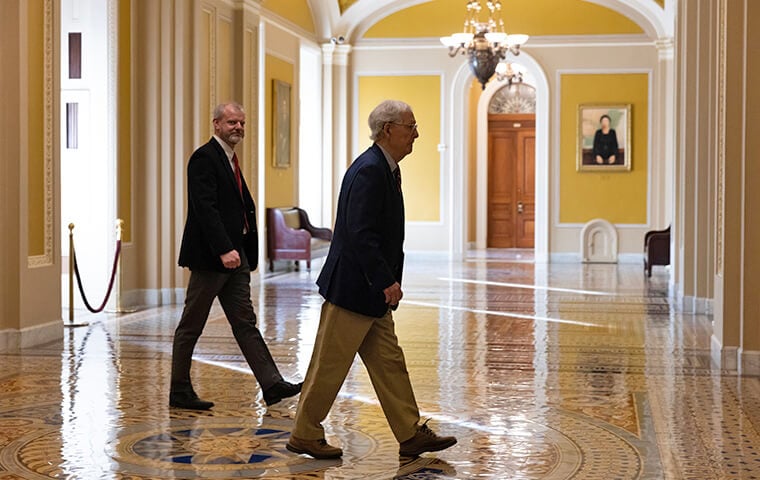 Senate Minority Leader Mitch McConnell (R) walks to the Senate chamber on Capitol Hill in Washington, DC, USA, 08 January 2024. The Senate and House of Representatives convene this week following a holiday recess as details are expected to be worked out on a 1.7 trillion dollar government funding package. Congress has a deadline on 19 January to pass funding legislation in order to avert a government shutdown. Image: MICHAEL REYNOLDS/EPA-EFE/Shutterstock
By: FEDweek Staff
Senate Minority Leader Mitch McConnell (R) walks to the Senate chamber on Capitol Hill in Washington, DC, USA, 08 January 2024. The Senate and House of Representatives convene this week following a holiday recess as details are expected to be worked out on a 1.7 trillion dollar government funding package. Congress has a deadline on 19 January to pass funding legislation in order to avert a government shutdown. Image: MICHAEL REYNOLDS/EPA-EFE/Shutterstock
By: FEDweek StaffProspects have improved of avoiding what could be a two-phase partial government shutdown starting next Friday (January 19), following a bipartisan agreement among congressional leaders over agency spending levels for the current fiscal year.
Those figures largely are in line with those in the law enacted last spring that suspended the federal debt ceiling until 2025 and that meanwhile set overall spending levels for both the defense and non-defense sides. That law also provided for automatic “sequestration” cuts if regular appropriations bills are not enacted.
The White House has endorsed the latest outline, saying it “provides a path to passing full-year funding bills.” Along with the spending targets, it contains some policy changes pushed by House Republicans, including rescinding some previously approved Coronavirus relief funding and speeding up the recission of some of the long-term funding boost approved in 2021 for the IRS. Democrats in turn say the agreement calls for excluding policy provisions that House conservatives have tried to attach to spending bills.
However, the agreement must first be turned into specific language, with the first deadline ahead for agencies funded by the Agriculture, Energy, HUD-Transportation and VA funding bills, and another deadline February 2 for all other agencies. Neither the House nor the chamber has scheduled voting on appropriations bills for this week, meaning that—as often has been the case—the shutdown threat likely will go down to the wire.
While another stopgap is possible, there is internal pressure in Congress to enact funding to carry through the rest of the current fiscal year, with the next budget cycle just ahead.
Also as has been the case with two temporary funding extensions that brought matters to this point, a group of the farthest-right House Republicans has dug in against the measure, calling for tighter budget limits and the inclusion of riders on matters such as immigration and social policies.
In this case, their primary focus has been on including elements of a bill on immigration policy that the House previously passed along party lines. Bipartisan negotiations have been underway in the Senate on that issue but it is uncertain whether any deal struck there would satisfy those House Republicans, even if one could be produced in time. The situation could once again leave House Republican leaders needing to rely on Democratic votes to keep agencies funded.
Shutdown Meter Ticking Up a Bit
Judge Backs Suit against Firings of Probationers, but Won’t Order Reinstatements
Focus Turns to Senate on Effort to Block Trump Order against Unions
TSP Adds Detail to Upcoming Roth Conversion Feature
White House to Issue Rules on RIF, Disciplinary Policy Changes
Hill Dems Question OPM on PSHB Program After IG Slams Readiness
See also,
How Do Age and Years of Service Impact My Federal Retirement
The Best Ages for Federal Employees to Retire

